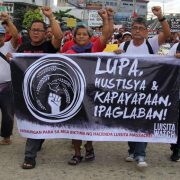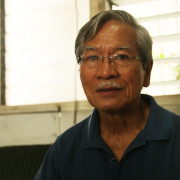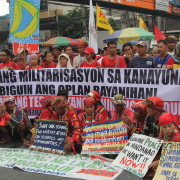The Mining Act of 1995 is a long-wrought tragedy for indigenous peoples
The benefits of mining argued by mining corporations as compensatory for its immense social costs and environmental destruction is a lie. Mining corporations in collusion with the government paint a rosy picture of mining, insisting on “responsible mining” and “there is life in mining” yet its impacts on the environment and people, especially to the indigenous peoples, tell a different story.
The Mining Act of 1995 is a long-wrought tragedy to indigenous people. It worsens foreign-favored, one sided, anti-people policy of liberalization of the mining industry. It bridges and aggravates the centuries-old foreign plunder of resources in our lands. The Mining Act of 1995 worsens the oppressions against us.
As our ancestors did, we have valiantly defended our lands from the transgressions, and today we defend our land and life from liberalized mining. However, we found ourselves pitted against government forces as they play protector of large-scale mines. Deployment of military forces where there are large-scale mining interests are massive.
As if the massive deployment of military was not enough, the AFP recruits indigenous peoples to paramilitary groups. Reneging its campaign promise to dissolve paramilitary groups at the aftermath of the Ampatuan massacre, President BS Aquino beefs up the viciousness of its armed forces by allowing the formation of paramilitary groups and use them as pawns in counter-insurgency and as mining security. Under the BS Aquino presidency, 50 indigenous peoples, including 6 indigenous women and 6 indigenous children, were slain by the AFP and paramilitary groups.
The violation of human rights of indigenous peoples worsened as a result of mining and militarization. On October 18, 2012, member of the 26th Infantry Battalion strafed the home of Juvy Capion, a Blaan woman and one of the leaders of the Blaan people’s fight against the mining operations of SMI-Xstrata in their ancestral lands. The attack on their home killed and 8 months- pregnant Juvy, and her two young sons. Kitari Capion, Datu Anting Freay, and 16-year-old Victor Freay adds to the lists of Blaan people killed by suspected military forces in the SMI-Xstrata mining site between 2012 and 2013.
Military operations also caused the forced evacuation of communities. Thousands of indigenous peoples repeatedly evacuated in Surigao del Sur, agusan del Sur, Compostela Valley, and Bukidnon among others.
In tandem with violence, the government uses deception to facilatate the entry of mining outfits in ancestral lands. The connivance of the government and mining corporations is best exemplified by the National Commission on Indigenous Peoples (NCIP.) The NCIP is the lead agency in deceiving, manipulating, bribing and dividing indigenous peoples.
Instead of upholding IP rights and welfare against business interests, NCIP only negotiated in favor of the latter. The NCIP conducts “consultations” for mining outfits to fulfill the mandated Free Prior Informed Consent of indigenous communities. However, the FPIC process is riddled with issues of corruption, bribery, and coercion; and it has been used to legalize the entry of development projects in ancestral lands. The IPRA neither projects nor defends the rights of indigenous peoples to their lands and self-determination. It is tool of the State, deceptive and lethal, for plunder and exploitations of indigenous people’s lands.
The Mining Act of 1995, aided by the IPRA and strengthened BS Aquino’s very own EO 79 is a deadly combination for the rights of indigenous peoples to their lands and to self-determination.
For us indigenous peoples, the BS Aquino administration brings no respite from environmental destruction, human rights violations, repression, and oppressions similar to past regimes. Its continued implementation of the Mining Act of 1995 is a testament to this fact.





